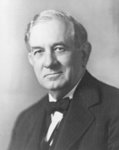Connally Hot Oil Act, United States
With an increase in foreign and domestic oil discoveries, the overproduction of oil throughout the 1930s had an adverse affect on commerce. Prior to enactment of the Connally Hot Oil Act, the United States government attempted to regulate the trade of oil in excess of a state’s quota (known as "hot oil") through the National Industrial Recovery Act of 1933, but the US Supreme Court vetoed the bill.
 U.S. Senator Thomas Terry (Tom) Connally. (Source: U.S. Library of Congress)
U.S. Senator Thomas Terry (Tom) Connally. (Source: U.S. Library of Congress) Senator Thomas Connally of Texas sponsored a bill known as the Connally Hot Oil Act. It became law on February 22, 1935. In general, the law was intended to protect foreign and interstate commerce against "contraband oil" and encourage the conservation of United States crude-oil deposits. It prohibited the shipment of hot oil. Under the law the president had the power to prescribe regulations and require certificates of clearance for petroleum and petroleum products to be moved interstate. It called for the establishment of boards to issue certificates. Boards could conduct hearings and investigations regarding the enforcement of the act, and the United States District Courts had exclusive jurisdiction regarding judicial matters and disputes over denied permits. Violators of the law paid a fine of up to $2,000 and were sentenced to as much as six months' imprisonment. The federal government could seize the contraband oil, though it had the option to return it to the original owner in cases of extreme hardship.
Though the legislation was intended to expire on June 16, 1937, it was maintained afterwards as a permanent law. There was some debate as to the law's effects on the transport of other fuels such as coal and timber, and many independent oil producers vehemently opposed the government regulations. However, in 1937 four federal courts upheld the Connally Act, which was later administered by the Federal Petroleum Board, a part of the Department of the Interior.
Further Reading
- Texas State Historical Association. Connally Hot Oil Act of 1935.